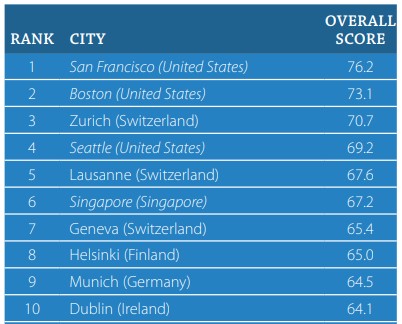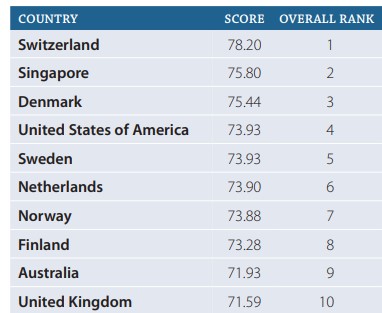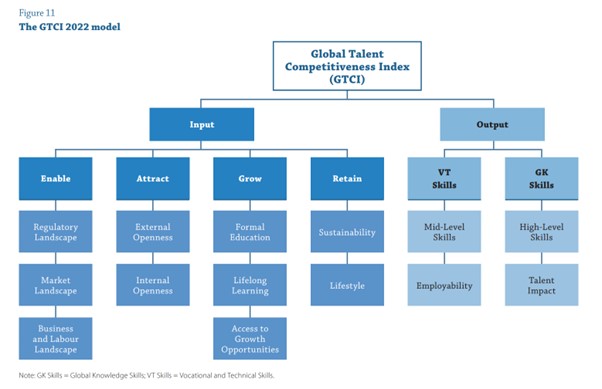The Global Talent Competitiveness Index (GTCI) has released its latest rankings, evaluating the world’s top 175 cities across 133 countries. The annual report measures and benchmarks the ability of countries and cities to grow, attract, and retain talent. It serves as a valuable resource for policy and decision-makers seeking to comprehend the global talent competitiveness landscape and formulate strategies to enhance their economies. The 2022 report encompasses 133 countries and 175 cities from 79 economies worldwide, spanning all income groups.
One notable feature of the GTCI is its ability to monitor trends over time. Australia has re-entered the top ten countries, in terms of talent competitiveness, ranking 9th overall. When we look at the talent competitiveness of Australian cities, however, we are further down the list, with Adelaide not making the ranking of 175 cities at all:
Global Cities Talent Competitiveness Index rankings and overall scores

29. Melbourne 57.4
31. Sydney 57.0
37. Perth 54.8
49. Brisbane 51.5
Global Talent Competitiveness Index 2022 ranking by country

Consistently high-performing countries provide decision-makers and global talent with greater confidence to select their city of domicile, especially given the rapidly evolving global context. While Switzerland and Singapore have maintained their leading positions, several European economies, particularly Nordic countries, are also performing well. Singapore, in particular, has prioritised the development of local talent and the attraction of global talent, which have been instrumental in driving its economy. The city-state’s strategic investments in human capital development, with a strong focus on education and lifelong learning, have played a pivotal role in nurturing a skilled talent pool and weathering the challenges posed by the pandemic and market volatility. Singapore ranks first globally in Formal Education and second in Lifelong Learning, reaping the benefits of its continuous investment in these areas.
The COVID-19 pandemic has brought about profound changes in how people live, work, and interact, resulting in an intensified global competition for talent. While the pandemic’s impact is gradually subsiding, significant geopolitical and economic uncertainties have prompted certain countries to adopt inward-looking policies to protect their workforce, while others have launched open initiatives to vie for global talent.
How are cities ranked?
In the context of the GTCI, talent competitiveness encompasses the range of policies and practices implemented by a country to foster the development, attraction, and empowerment of human capital, ultimately contributing to productivity and prosperity. The GTCI adopts an Input-Output model (refer to the figure below), which evaluates both the actions countries undertake to cultivate and acquire talent (Input) and the resulting skills available to them (Output).

This is a similar style model to that of global firms, the Attract – Grow – Retain talent management framework. At a country and city level, the GTCI generates a score based on the policies, resources and efforts of that location. For example, those relating to the regulatory and business environment that influence competitiveness, management practices and the labour market.
What can Adelaide do to be globally competitive?
The GTCI report states that ‘cities that appear well positioned to be future ready include medium sized cities (200,000 and 2 million population), as well as those that will prove agile enough to align and mobilise their resources along key lines such as digital transformation, offering attractive work environments to younger generations, and contributing to reaching Strategic Development Goals (SDGs) ‘of the United Nations.
So, our first step is to get on the GTCI list!
The model used by the GTCI provides guidance to cities on how to become more globally competitive in the talent landscape. At this moment, we don’t know where Adelaide stands in terms of internationally competitiveness for global talent, as we are not considered for measurement by this report. If we can measure it, we can manage it, and aim to climb in the rankings to attract the people and develop and implement the policies we need for a prosperous city and state, and to meet the objectives laid out in the South Australian Economic Statement.
About The Global Talent Competitiveness Index 2022
Every year, the GTCI report is released by INSEAD, the Business School for the World, in partnership with the Portulans Institute, an independent non-profit research and educational institute located in Washington DC and Knowledge Partner, the Human Capital Leadership Institute (HCLI). It ranks the attractiveness of cities to attract and retain global talent.
The GTCI aims to assist decision-makers in government, business, and civil society in comprehending the talent landscape’s challenges and opportunities. This index provides essential insights that enable leaders to make better-informed policies, business decisions, and talent strategies, ultimately helping economies and businesses maintain competitiveness in the global marketplace. Our vision is for policies to be carefully calibrated to foster an ecosystem that prioritizes human capital development and value creation.
Information and infographics in this article is taken from this report.
INSEAD (2022): The Global Talent Competitiveness Index 2022: The Tectonics of Talent: Is the World Drifting Towards Increased Talent Inequalities? Fontainebleau, France